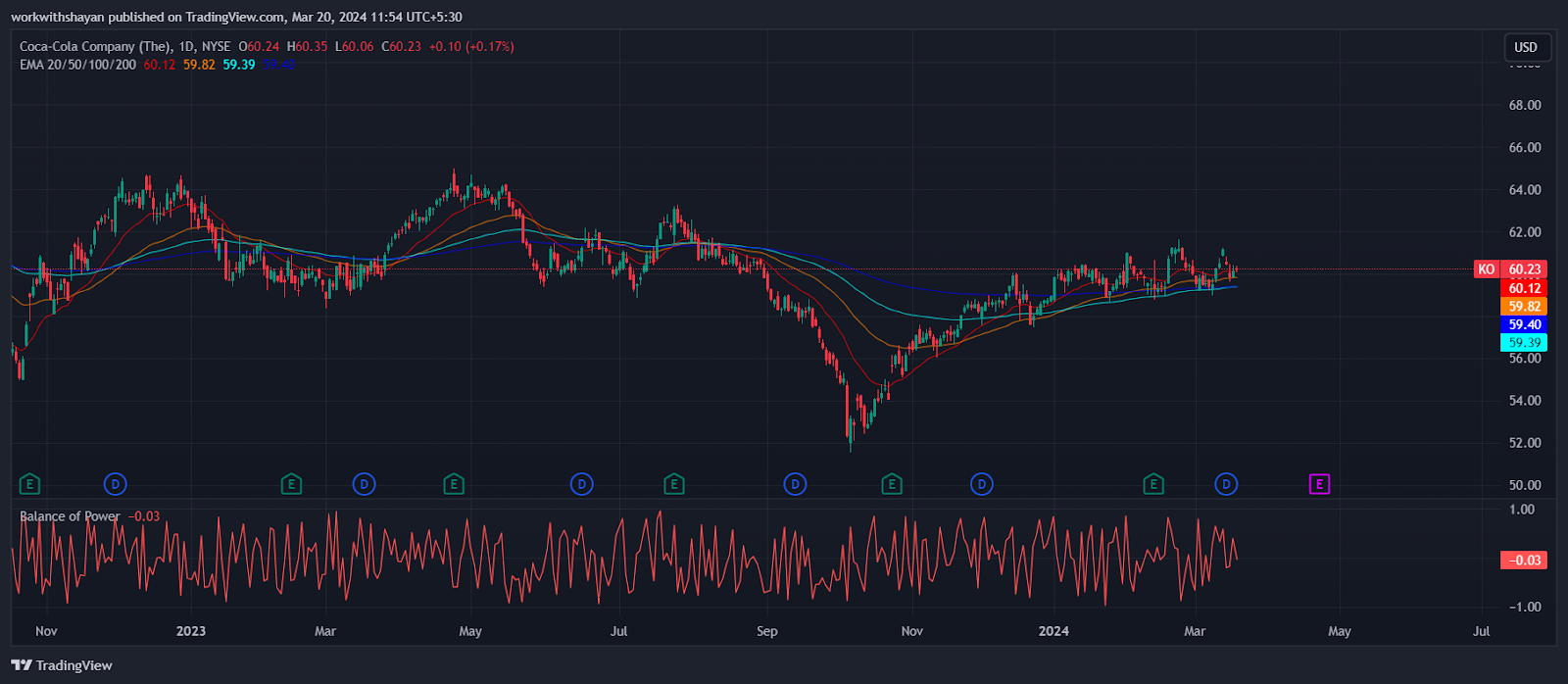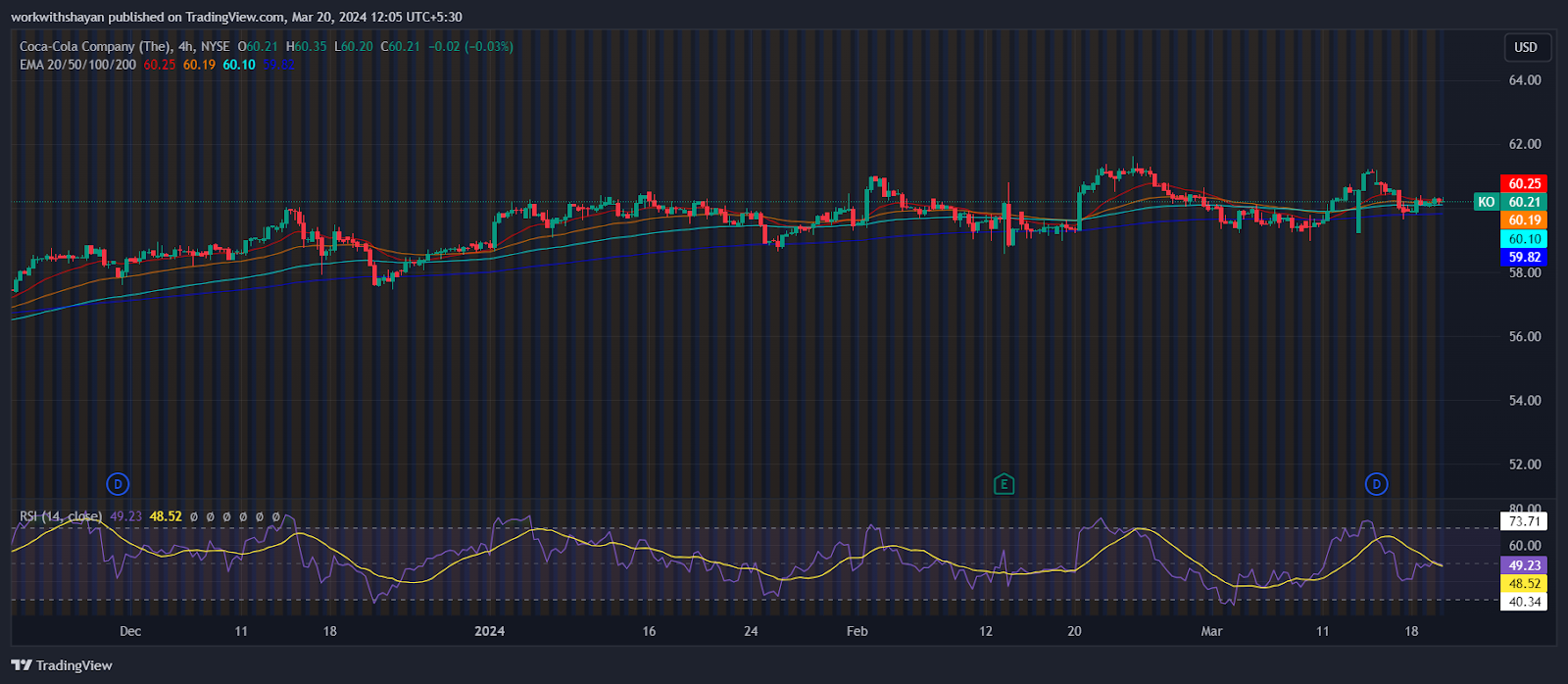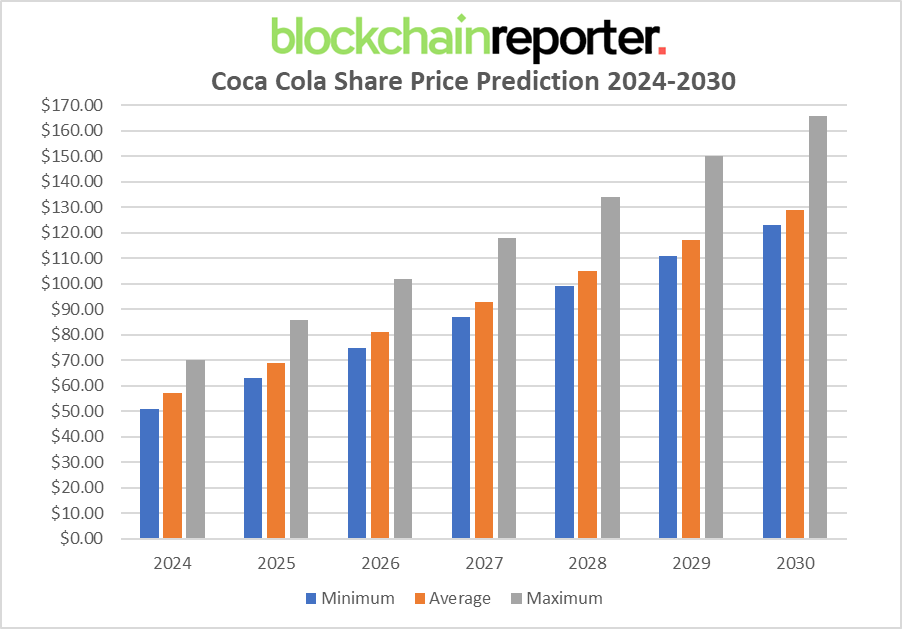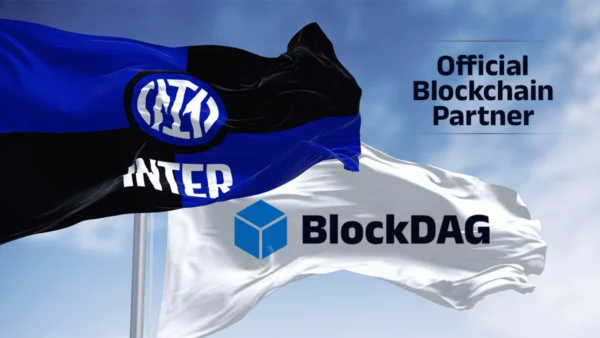
- 1. The Coca Cola Company: A Quick Overview
- 2. Coca Cola: History And Controversies
- 3. Coca Cola Stock Price Prediction: Price History
- 4. Coca Cola Stock Prediction: Technical Analysis
- 5. Coca Cola Price Prediction By Blockchain Reporter
- 6. KO Stock Price Forecast: By Experts
- 7. Conclusion
- 8. FAQ
- 8.0.1. What is Coca-Cola's significance in the market?
- 8.0.2. What should potential investors know about Coca-Cola's stock?
- 8.0.3. What is the current Coca-Cola stock price prediction for 2024 to 2030?
- 8.0.4. What are expert analysts saying about Coca-Cola's stock?
- 8.0.5. What makes Coca-Cola (KO) a notable investment?
- The Coca Cola Company: A Quick Overview
- Coca Cola: History And Controversies
- Criticism
- Coca Cola Stock Price Prediction: Price History
- KO Dividend History
- Coca Cola Stock Prediction: Technical Analysis
- Coca Cola Price Prediction By Blockchain Reporter
- Coca Cola Price Prediction 2024
- Coca Cola Price Prediction 2025
- Coca Cola Price Prediction 2026
- Coca Cola Price Prediction 2027
- Coca Cola Price Prediction 2028
- Coca Cola Price Prediction 2029
- Coca Cola Price Prediction 2030
- KO Stock Price Forecast: By Experts
- Conclusion
- FAQ
The Coca-Cola Company is more than just a beverage manufacturer; it’s an iconic brand that has met the thirst of millions around the globe for over a century. Founded in 1886, this American multinational has grown from a simple curiosity in a small Atlanta pharmacy to a colossal entity that symbolizes refreshment, happiness, and shared moments. Its red and white logo is instantly recognizable, making it a staple in both rural towns and bustling cities. Coca-Cola’s journey from a single product to a vast portfolio of soft drinks, water, juices, and teas reflects its innovation in the face of changing consumer tastes and market trends. Investing in Coca-Cola is often seen as investing in a slice of history. However, the company’s stock is not just about owning a piece of nostalgia; it’s about participating in its future growth. As we dive deeper, we’ll explore how Coca-Cola has managed to remain relevant in the beverage industry, its financial health, stock performance, and what potential investors might consider before adding KO (Coca-Cola’s stock ticker symbol) to their portfolios. Whether you’re a seasoned investor or just curious about the company behind the favorite soda, understanding Coca-Cola’s business and stock is crucial. Additionally, KO dividend history shows a solid increase over the years, which might soon attract new investors to the market.
The Coca Cola Company: A Quick Overview
The Coca-Cola Company, established in 1892, is a global powerhouse headquartered in the United States. Renowned for its flagship beverage, Coca-Cola, the company extends its reach beyond just one product. It is actively engaged in the production, sale, and distribution of a diverse array of non-alcoholic drink concentrates and syrups, as well as venturing into the alcoholic beverage market. Its shares are publicly traded on the New York Stock Exchange, and it proudly holds positions within the Dow Jones Industrial Average as well as the S&P 500 and S&P 100 indices.
Coca-Cola’s inception goes back to 1886, credited to John Stith Pemberton, a pharmacist who initially concocted the beverage as a stimulant combining cocaine from coca leaves and caffeine from kola nuts. This unique blend not only gave birth to the product’s name but also contributed to its early reputation as a beneficial health tonic. Following his service in the Civil War, Pemberton sought relief from his morphine addiction, leading him to create this “patent medicine.”
By 1889, the secret formula and the Coca-Cola brand were sold to Asa Griggs Candler for $2,300, equivalent to about $71,000 today, marking the beginning of the Coca-Cola Company in Atlanta. Adopting a franchised distribution model since its early days, the company primarily focuses on producing syrup concentrate. This concentrate is then supplied to a network of bottling partners around the globe, each holding exclusive rights within their territories. Additionally, the company directly owns Coca-Cola Refreshments, its primary bottler in North America.
Coca Cola: History And Controversies
In 1886, John Stith Pemberton, a Georgia pharmacist, invented Coca-Cola as a medicinal tonic. The product’s name and logo came from Pemberton’s bookkeeper, Frank Mason Robinson. Under Robinson’s solo promotion, Coca-Cola found success. Asa Griggs Candler bought the brand in 1889, founding the Coca-Cola Company in Atlanta in 1892, making the drink nationally available by 1895. Coca-Cola has consistently utilized innovative advertising, maintaining a strong market presence despite competition.
The company has grown through acquisitions, including Minute Maid in 1960, Columbia Pictures in 1982, and later beverage brands like Thumbs Up and Barq’s, alongside investments in health and energy drinks. Coca-Cola’s strategy extended to acquiring stakes in companies like Monster Beverage and purchasing international brands like Topo Chico and Costa Coffee.
With sales in over 200 countries, Coca-Cola has a vast global footprint and remains a leading force in the beverage industry, adapting its portfolio to meet changing consumer tastes.
Criticism
Since the early 2000s, The Coca-Cola Company has faced significant criticism and legal challenges over its products and business practices, including health concerns, environmental harm, animal testing, unethical business practices, and employee relations issues. Among the key areas of contention are:
Plastic Pollution: Coca-Cola produces over 3 million tonnes of plastic annually, contributing significantly to global plastic waste. The company has been labeled as a leading plastic polluter, with its shift from reusable glass to single-use plastic bottles exacerbating pollution in regions like Samoa. Despite public criticism and being named the world’s most polluting brand by Forbes, Coca-Cola has been resistant to reducing its plastic use, citing consumer preference for resealable, lightweight plastic bottles.
However, the company pledged to increase the use of recycled materials in its packaging to 50% and recycle the equivalent of 100% of its packaging by 2030. Initiatives include selling reusable bottles and transitioning to fully recyclable bottles in Sweden by 2020.
Energy and Water Usage: The production of high fructose corn syrup, a key ingredient in many Coca-Cola products, is energy-intensive and relies heavily on fossil fuels, contributing to carbon emissions. Additionally, Coca-Cola’s operations have been criticized for depleting local water sources, with significant drops in water levels observed in areas surrounding its bottling plants, impacting local communities and agriculture.
Racial Discrimination: Coca-Cola settled a racial discrimination lawsuit in 2000 for $192.5 million and committed to improving diversity and equality in its workforce. Despite these efforts, the company has faced ongoing criticism and legal action over racial discrimination, including a notable controversy in 2021 involving an employee training course that urged employees to “be less white” to combat arrogance and oppression.
These controversies highlight the complex challenges facing Coca-Cola as it navigates public scrutiny and demands for more sustainable and ethical business practices.
Coca Cola Stock Price Prediction: Price History
Coca-Cola, officially known as The Coca-Cola Company, has a storied stock history that dates back to its incorporation in 1892 and its initial public offering in 1919, when shares were first sold at $40 each. The journey of Coca-Cola’s stock over the decades mirrors global economic shifts, wars, technological progress, and changes in consumer preferences.
In the years following its IPO, Coca-Cola embarked on a path of growth that accelerated particularly after World War II, as it expanded its global footprint. The late 20th century, especially the 1980s and 1990s, marked a period of vigorous marketing campaigns and further international expansion, significantly boosting the company’s stock value. However, in 1984, the price of KO stock was at $1.1. The price began to surge in the following years and reached the $40 mark again in 1998.
Entering the 2000s, Coca-Cola faced more volatile market conditions, reflecting economic uncertainties. However, it continued to grow, partly through strategic acquisitions and diversifying its beverage portfolio to include healthier options, responding to changing consumer tastes. Despite the challenges, Coca-Cola’s stock showed potential; however, it consolidated around the $40 mark till 2014, benefitting from its status as a dividend aristocrat—a title awarded to companies that have consistently increased dividends for at least 25 years.
Later, the stock price skyrocketed as it touched $60 just before the Covid pandemic. Following a minor decline, the stock price currently hovers around the $60 mark.
KO Dividend History
Starting in 1996, Coca-Cola paid a quarterly dividend of $0.125 per share, which set the foundation for its reputation as a dependable dividend-paying stock. Notably, the dividends have seen a gradual uptick almost annually. By 2003, the quarterly dividend rate had risen to $0.22 per share, showcasing a steady climb from its earlier figures. This pattern of growth persisted, with the dividend reaching $0.305 per share by 2014, highlighting Coca-Cola’s consistent performance.

The trend of annual increases continued, with the dividend rate growing to $0.41 per share by 2020. The most recent update in 2024 demonstrates Coca-Cola’s ongoing dedication to its shareholders. The company announced a cash dividend of $0.485 per share, payable on April 1, with the record date set for March 15. This recent increase from a previous rate of $0.46 per share in 2023 underscores the company’s robust financial health and hope about the future.
Coca Cola has declared a dividend of $0.49 per share, which will be paid out on April 1, 2024. The ex-dividend date is scheduled for March 14, 2024. As this payment approaches, investors are closely examining the company’s history of dividends, as well as its yield and growth rates, drawing significant attention to these aspects.
Currently, Coca-Cola Co boasts a dividend yield of 3.23% based on the last 12 months, with a PE ratio of 24.29, indicating anticipated growth in dividend payouts.

In the last three years, the company has seen its annual dividend increase by an average of 3.90%. When looking at a broader timeframe, the growth rate over five years drops slightly to 3.30% annually. Over a ten-year period, Coca-Cola Co has achieved an average annual dividend growth rate of 4.70%.
Factoring in the company’s dividend yield and its growth rate over the past five years, the expected 5-year yield on cost for Coca-Cola Co’s stock stands at approximately 3.55% as of the current date. The annual dividend is at $1.94.
Coca Cola Stock Prediction: Technical Analysis
Recently, Coca Cola’s stock has experienced a significant increase in its value, contributing to its upward momentum. Nevertheless, resistance at the $61 mark has been strongly upheld by bearish traders, leading to a slight pullback in the stock’s price. The stock’s performance has been positively influenced by the company’s financial outcomes and settlements, as well as its KO dividend history. A closer look at Coca Cola’s technical analysis shows promising bullish indicators, but these could quickly diminish if bearish activity escalates. Investors are advised to proceed with caution due to the uncertain prospects for short-term growth in Coca Cola’s stock price. The sustainability of the recent price increase is questionable, casting doubt on Coca Cola’s stock’s ability to remain a robust investment choice.

TradingView indicates that Coca Cola (KO) shares are priced at $60.2, marking a modest increase of approximately 0.2% over the last day. Detailed analysis of the stock’s performance suggests that despite a potential ongoing downward trend, there is a significant chance for a bullish reversal, given the stock’s upward trajectory since October 2023. Although KO stock encounters resistance at the $60 level, there is potential for a boost in buying interest around the immediate Fibonacci retracement levels, which may initiate a shift towards positive momentum. Observations from the daily price chart show that KO shares have established a support level around $57, serving as a foundation for potentially breaching the next resistance level. With the stock price recently surpassing various Exponential Moving Average (EMA) trend lines after moving above $60, this could attract investors to initiate long positions, possibly sending the stock higher in the near term. The Balance of Power (BoP) indicator, currently positioned in a slightly bearish zone at 0.03, hints at a minor pullback in the coming hours.

To thoroughly analyze the price of KO shares, it is crucial to take a look at the RSI-14 indicator. The RSI indicator recently experienced a decline below the midline as it hovers around a selling region at 49-level. It is anticipated that KO stock price will soon attempt to break above its 38.6% Fibonacci level to achieve its short-term bullish goals. If it fails to climb above this Fibonacci region, a downtrend might occur.
As the SMA-14 continues its downward swing near the 48-level, it trades around the RSI line, potentially accelerating the stock’s downward correction on the price chart. However, if KO shares break above the consolidation zone and surge above the Fib lines, it can pave the way to the crucial resistance of $62. A breakout above the strong resistance will drive the share price toward the upper limit of the Bollinger band at $70.
Conversely, if KO stock price fails to hold above the critical support level of $57, a sudden collapse may occur, resulting in further price declines and causing the KO share to trade near the crucial support zone at $52.
Coca Cola Price Prediction By Blockchain Reporter

Coca Cola Price Prediction 2024
The Coca Cola stock is forecasted to achieve a minimum price of $51 in 2024. It is anticipated that the stock could reach a maximum price of $70, with an average trading price of $57 throughout the year.
Coca Cola Price Prediction 2025
Based on projections and market analysis, the price of Coca Cola stock in 2025 is expected to have a minimum value of $63. The maximum stock price is predicted to be $86, with an average value of $69 over the year.
Coca Cola Price Prediction 2026
The forecast for 2026 suggests that Coca Cola’s stock price will have a minimum value of $75. The stock is expected to reach a maximum price of $102, maintaining an average price of $81 throughout the year.
Coca Cola Price Prediction 2027
Analyses indicate that in 2027, the minimum price of Coca Cola stock will be $87. The stock could reach a maximum value of $118, with the average trading price expected to be $93 during the year.
Coca Cola Price Prediction 2028
For 2028, the Coca Cola stock is anticipated to reach a minimum price of $99. The maximum price projection is $134, with the stock expected to trade at an average of $105 over the year.
Coca Cola Price Prediction 2029
According to future predictions, the Coca Cola stock price is expected to have a minimum value of $111 in 2029. The stock could reach a maximum value of $150, with an average trading price of $117 throughout the year.
Coca Cola Price Prediction 2030
In 2030, the price of Coca Cola stock is forecasted to reach at a minimum value of $123. The stock price could achieve a maximum value of $166, with the average trading price expected to be $129 throughout the year.
KO Stock Price Forecast: By Experts
In its latest 13F filing with the SEC, IFP Advisors Inc disclosed a 23.6% decrease in its ownership of The Coca-Cola Company (NYSE:KO) during the fourth quarter. The firm sold 12,196 shares, leaving it with a total of 39,526 shares of Coca-Cola’s stock. As of the most recent filing, the value of IFP Advisors Inc’s Coca-Cola holdings stood at $2,329,000.
Due to this, leading analysts have their targets for KO share price. JPMorgan Chase & Co. increased their price target for Coca-Cola shares from $64.00 to $66.00, assigning an “overweight” rating in their research note. Similarly, Barclays raised their price target on Coca-Cola from $60.00 to $66.00, also with an “overweight” rating. Additionally, Citigroup adjusted their price target upwards for Coca-Cola from $67.00 to $68.00, giving the stock a “buy” rating.
Among analysts, two have given the stock a hold rating, while six have recommended a buy. According to MarketBeat data, Coca-Cola enjoys a “Moderate Buy” consensus rating with an average price target of $67.00.
Conclusion
During Coke’s earnings call on February 13, James Quincey, the company’s chairman and CEO, emphasized to analysts that “taste is the selling point.” The company announced fourth-quarter earnings of 49 cents per share, aligning with analyst expectations as surveyed by FactSet. Its sales reached $10.95 billion, surpassing the FactSet prediction of $10.67 billion. This represents an increase from the previous year’s fourth-quarter earnings of 45 cents per share and sales of $10.19 billion.
Quincey highlighted the importance of flavor, stating, “Simply put, people want drinks that taste great.” He discussed the company’s efforts to enhance the quality across its entire range of beverages by leveraging unique insights into taste and aroma science.
The use of digital tools, ingredient processing technology, and artificial intelligence is part of Coke’s strategy for developing “bolder and more successful innovations,” according to Quincey.
He pointed to Coca-Cola Zero Sugar as a prime example of how prioritizing superior taste can stimulate demand. The product saw a 5% volume growth in 2023, contributing to ongoing gains in both volume and market value share, Quincey explained.
FAQ
What is Coca-Cola’s significance in the market?
Coca-Cola, recognized globally for its iconic branding and extensive beverage portfolio, has quenched the world’s thirst for over a century. With a solid KO dividend history, the company represents a mix of historical value and growth potential for investors.
What should potential investors know about Coca-Cola’s stock?
Investors considering Coca-Cola’s stock (KO) should examine its consistent performance, financial health, and the company’s strategy for future growth. The KO dividend history is a testament to its long-term value proposition.
What is the current Coca-Cola stock price prediction for 2024 to 2030?
Predictions from 2024 to 2030 suggest a gradual increase in Coca-Cola’s stock price, reflecting confidence in the company’s market strategy and growth potential. The forecast anticipates a rise from a minimum of $51 in 2024 to a potential high of $166 by 2030.
What are expert analysts saying about Coca-Cola’s stock?
Expert analysts, including those from JPMorgan Chase & Co. and Citigroup, have set optimistic price targets for Coca-Cola’s stock, indicating a favorable outlook based on the company’s market strategy and performance.
What makes Coca-Cola (KO) a notable investment?
Coca-Cola’s robust KO dividend history, marked by consistent growth and stability, positions it as a compelling choice for investors seeking reliable returns in the beverage industry.









